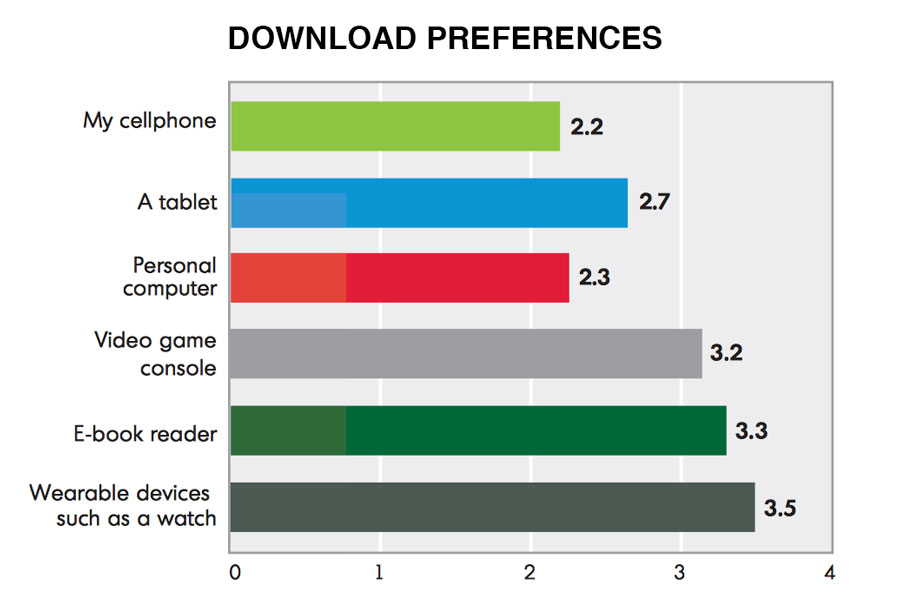Sydney-based Big Mobile ceo Graham Christie, a regular M+AD contributor, wraps up the latest mobile news from around the APAC region:
A study conducted by Limelight Networks called The State of Digital Downloads across Australia, Canada, United Kingdom, and the United States concludes that the smartphone has overtaken the personal computer as the dominant device for downloading digital content with the tablet device coming in third.
Respondents say most downloaded types were movies, music and mobile apps. Over half of people asked said they only download movies or TV shows if they are free, and 64% say they download mobile apps if they’re free.
Piracy an option
The greatest propensity to pay for content was for music and games. Day-part wise, unsurprisingly, consumers tend to download at night. A headline for me was a closer look at Millennials as a segment, who, when compared to the survey base, were more likely to download content right across the day, have less patience with download speeds, and more likely to pirate content.
I guess the take-outs are: Have a diversified distribution strategy but move to a mobile-first mindset if you haven’t already; take a close look at shaping the CX from a download speed (ISP) perspective; and if you’re a content owner, beef up your security.
(Note that the lower the device score in the chart, the more often the device is used to download content. I know, a bit odd).
Native Ads to lead Mobile Ad Revenue by 2020
Business Insider has reported that Native will account for 63% of mobile display ad revenue in 2020, up from 52% in 2015. As a point of reference, Native accounted for 14% of ad revenue in 2014.
Now, this is research conducted by HIS on behalf of Facebook, so – eyes open people. Programmatic, or at least greater automation of buying/selling, is seen as a key ingredient that will fuel this growth. I believe Native is appealing on many levels, with the ability to blend page content with ad content more seamlessly, the engagement that that delivers, and yes, the ease of deployment.
I do feel though that there can be an over-dependence and spend on Native type advertising, which by its very nature offers a more homogenised version of a brand’s message. Just like other mediums, a balance needs to be struck leveraging a range of opportunities that fit the decision pathway, and dialling up or down the style of impact.
Mobile lift and – dare I say – Web vs App
The Smaato network has released some figures based on its perspective of the mobile industry, and data from trading in the December quarter last year. Whilst it is quite US-centric, what’s notable is that in that market, mobile for the first time took the majority share of all digital spending (51.9%).
Here’s an eye-watering figure – China’s mobile adspend grew 1246% – for the quarter. Total adspend on the mobile web is up 101% year-on-year, while the volume of mobile web ad impressions has also doubled.
The splits overall in that network is 62% impressions on apps and 38% on the mobile web. From an OS point of view, globally Android accounted for 35%, iOS 20%, and Windows 5%, although the Apple impressions accounted for 33% of revenue reinforcing that that audience remains more valuable, but eCPMs on Android are narrowing the gap.
Video in China
It appears that consumers in China are less enamoured with video ads as people in other markets. So says eMarketer, reporting on a study by Kantar Millward Brown which found only 9% of respondents were receptive to video ads on mobile, and 10% on tablets.
This does sync with historical distaste for video ads on desktop. However, eMarketer estimates that advertisers in China will spend US$5.62 billion on digital video placements this year, up 44.6% over 2015. Nearly $3.1 billion in spending will go toward mobile video ads specifically.
Sir John Hegarty says …
When one of the most awarded creative people on the planet speaks about digital, we should listen. The co-founder of BBH says that “it’s time to put creativity back into the heart of advertising”, but in the same breath also acknowledging that doing so is a challenge.
I agree on both points. It’s the reason we have developed Creative Impact in our business, to take mobile advertising creatively to the next level, but this stance also serves to highlight a malaise affecting many people in digital marketing.
I’m not the first to say this, I know, but the obsession with technology outcomes all too often takes precedence over other, more important considerations – and I think is worsening as digital speeds up.
We have all spent time and money aligning ad-tech, going a long way to solving the riddle of getting an ad to right person, at the right place, at the right time, at scale and more seamlessly, but unless we now use this expensive infrastructure to deliver great quality communications that moves people, it’s utterly meaningless. We’re marketers not engineers.
Poor Mobile UX with funny tragic consequences
Lastly, and on a comic note, have you seen Adobe’s new TVC for their Marketing Cloud services? Created by Goodby Silverstein & Partners, it’s the latest in a line of actually quite dark sarcastic spots, highlighting the effects of poor digital marketing, this time focussing on mobile user experience.
The narrative of the TVC revolves around two buddies out hiking, one getting bitten by a nasty snake and needing urgent attention. To the rescue comes the smartphone with good signal strength, even in the wilderness.
Then, however, follows a user experience over mobile that’s a long way short of optimal. It is funny, and you will smile. Take a look for the vid called Snakebite: How’s Your Customer Experience? | Adobe Marketing Cloud. This should be played in every digital team’s boardroom in my view.
Share this Post



